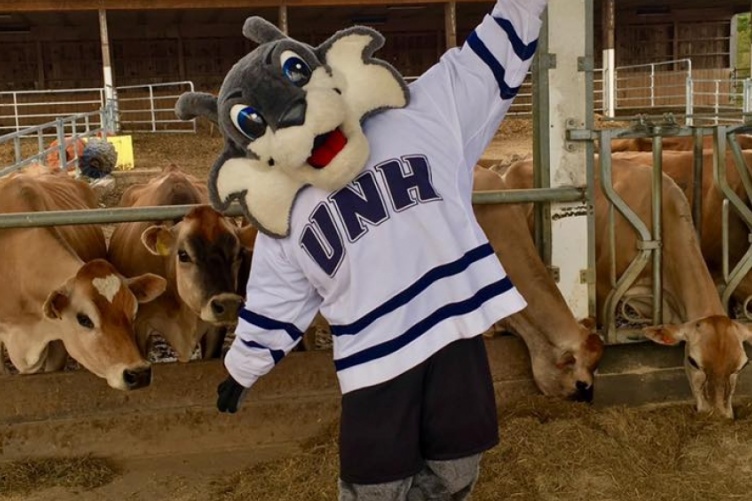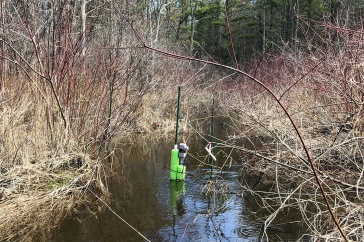
Wild E. Cat loves the Jersey cows at the UNH Organic Dairy Research Farm.
DURHAM, N.H. – Researchers with University of New Hampshire College of Life Sciences and Agriculture have received a near $2 million grant to help organic dairies remain profitable in the face of ongoing dairy market changes. Led by scientists with the New Hampshire Agricultural Experiment Station, the research will develop new science-based management techniques to boost productivity and economic efficiency and, in turn, support the continued supply of New England organic dairy products locally and regionally.
The $1,977,078 grant is among 20 recent awards by the U.S. Department of Agriculture’s National Institute of Food and Agriculture to support the Organic Research and Extension Initiative. The 2020 grants, totaling more than $17 million, will fund research, education, and extension projects to improve yields, quality, and profitability for producers and processors who have adopted organic standards.
“Organic dairy is undergoing a transition. After a decade-long 'boom' cycle, where demand outpaced production, diminished demand for fluid milk and lower pay prices are acute threats to the sustainability of the organic dairy industry here in New England and elsewhere. Given this new reality, the need to enhance production efficiency, feed quality, and milk components has become even more critical to ensuring that organic dairy remains a profitable enterprise,” said Andre Brito, associate professor of agriculture, nutrition, and food systems.
According to Statista, the global market value of the organic dairy product market was $18 billion in 2017 and is projected to grow to $28 billion by 2023. North America is home to one of the largest organic dairy markets and is estimated to grow by 14.3 percent between 2016 and 2022. In 2018, sales of organic cow's milk yielded approximately $1.36 billion in the United States.
Britt Lundgren, director of organic and sustainable agriculture with Stonyfield Farm, called the research invaluable.
“Back in 2006, there were no land-grant universities with a farm dedicated to researching organic dairy production. Stonyfield and other organic dairy companies came together to help fund the UNH Organic Dairy Research Farm to create a much-needed space for the kinds of research that are directly beneficial to organic dairy producers. This new research will support organic dairy producer profitability, productivity, and long-term sustainability. It’s invaluable for supporting the future of organic dairy in the Northeast,” Lundgren said.
In this recently funded research, scientists will test whether forage legume crops common to pastures in the New England and the Midwest—red and white clovers and alfalfa—can help address several pressing challenges facing today's organic dairy industry. These include maximizing forage yields and reducing the need for costly grain imports, successfully implementing high-forage diets to capitalize on “grass-fed” and other specialty milk markets, and optimizing the nutritive value of dairy diets to improve yields of milk and milk components, particularly milk fat and protein.
"Forage legumes are key to addressing these challenges and our project aims to identify strategies for optimally utilizing legumes in organic dairy systems; however, in order to successfully capitalize on their benefits, we must also quantify and manage their potential tradeoffs," said Richard Smith, associate professor of natural resources and the environment.
Forage diets high in legumes can be associated with a higher intake of phytoestrogens, which can negatively impact animal reproductive health. The group of scientists will assess and quantify these tradeoffs and develop best practice recommendations for organic dairy producers.
"This project will take a holistic, systems-level approach to identifying and managing the tradeoffs associated with diets high in forage legumes so organic dairy farming remains a strong and vibrant component of New England’s agricultural landscape,” Smith added.
The scientists also will research best practices for establishing and maintaining alternative forage legumes in pastures and hayfields across different growing environments. Two such alternatives, birdsfoot trefoil and kura clover, are of emerging interest to dairy farmers because of their benefits to dairy nutrition and purported lack of phytoestrogens. Other legume alternatives may be identified and examined in collaboration with colleagues at the Pasture Systems Lab at the University of Western Australia, who are pioneers in developing new forage legumes and who have been conducting research on the effects of phytoestrogens on livestock for decades.
This research and educational program will bring together the efforts of two premier land-grant organic dairy research farms at the University of New Hampshire and University of Minnesota. The University of Maine will provide farmers with information and strategies for managing mixed grass-legume stands to optimize legume proportion, persistence, and quality. At the same time, scientists will build a baseline dataset on quality components and phytoestrogen concentrations in forage legumes and milk for guiding future research and extension.
The educational program will include the sharing of forage legume information to farmers and other dairy professionals via field days and workshops, a new international research and education exchange involving the UNH team and colleagues from the University of Western Australia, and development of a forage quality and phytoestrogen prediction tool to aid dairy farmers in managing the intake of phytoestrogens.
In addition to Brito and Smith, UNH researchers include Marta Lima and Paul Tsang; Brad Heins and Joleen Hadrich at the University of Minnesota; and Juan Romero at University of Maine. Collaborators include personnel at the University of Vermont and Kevin Foster and Megan Ryan at the University of Western Australia, the Wolfe’s Neck Center in Freeport, ME, and The Organic Center in Washington, D.C.
This material is based upon work supported by the NH Agricultural Experiment Station, through joint funding of the National Institute of Food and Agriculture, U.S. Department of Agriculture, under award number 1023638, and the state of New Hampshire.
Founded in 1887, the NH Agricultural Experiment Station at the UNH College of Life Sciences and Agriculture is UNH’s original research center and an elemental component of New Hampshire's land-grant university heritage and mission. We steward federal and state funding, including support from the USDA National Institute of Food and Agriculture, to provide unbiased and objective research concerning diverse aspects of sustainable agriculture and foods, aquaculture, forest management, and related wildlife, natural resources and rural community topics. We maintain the Woodman and Kingman agronomy and horticultural research farms, the Macfarlane Research Greenhouses, the Fairchild Dairy Teaching and Research Center, and the Organic Dairy Research Farm. Additional properties also provide forage, forests and woodlands in direct support to research, teaching, and outreach.
The University of New Hampshire is a flagship research university that inspires innovation and transforms lives in our state, nation and world. More than 16,000 students from all 50 states and 71 countries engage with an award-winning faculty in top ranked programs in business, engineering, law, liberal arts and the sciences across more than 200 programs of study. UNH’s research portfolio includes partnerships with NASA, NOAA, NSF and NIH, receiving more than $100 million in competitive external funding every year to further explore and define the frontiers of land, sea and space.
-
Written By:
Lori Tyler Gula, Ph.D., '19 | NH Agricultural Experiment Station | lori.gula@unh.edu | 603-862-1452
















































